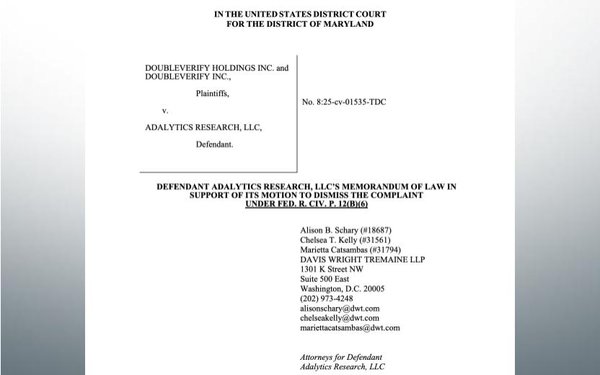
Advertising
analytics company Adalytics is urging a federal judge to throw out a lawsuit by DoubleVerify, which claims it was defamed by an Adalytics report regarding invalid traffic.
"This lawsuit is a textbook effort by a large corporation to shut down First Amendment-protected discourse and criticism about its industry," Adalytics argues in a motion urging U.S.
District Court Judge Theodore Chuang in Greenbelt, Maryland to dismiss DoubleVerify's complaint.
The filing comes in a legal battle dating to May, when DoubleVerify sued Adalytics over the report "On pre-bid bot detection and filtration -- Are ad tech vendors serving US Government and Fortune 500 brands’ digital ads to
bots?"
advertisement
advertisement
Adalytics wrote in the report that its research "suggested that advertisers were billed by ad tech vendors for ad impressions served to declared bots operating out of
known data center server farms."
The report mentioned several ad verification companies, including DoubleVerify.
Soon after the report came out, Senator
Mark Warner (D-Virginia) asked the Federal Trade Commission and Department of Justice to investigate whether verification vendors including DoubleVerify misrepresented their ability to detect traffic
from bots.
Subsequent to the report's publication, the Media Ratings Council said in a rebuttal that Adalytics focused on pre-bid detection and filtration, but
the industry standard relies on a back-end process that filters invalid traffic after ads are served.
DoubleVerify also said in a separate rebuttal that the Adalytics report was "inaccurate and misleading," adding that it was "based on the
incorrect premise" that advertisers pay for invalid traffic. DoubleVerify added that if invalid traffic isn't filtered out pre-bid, it's removed post-bid from the billable impressions shared with
advertisers.
DoubleVerify alleged in its lawsuit that Adalytics' statements "falsely assert and imply that DoubleVerify’s services are ineffective and that
DoubleVerify’s customers routinely pay for advertising impressions that are served to robotic agents ('bots'), referred to as invalid traffic ('IVT'), rather than to genuine human
consumers."
DoubleVerify added that Analytics' statement regarding advertisers being billed for impressions served to bots "appears to be based on Adalytics’ willful
blindness to post-serve detection and filtration."
The complaint includes claims that Adalytics defamed DoubleVerify and engaged in false advertising.
Adalytics now argues in its motion to dismiss the complaint that DoubleVerify's allegations, even if proven true, wouldn't establish its claims.
"As the title
indicates, the report focused only on 'pre-bid' (not 'post-bid') services offered by various ad-tech vendors," Adalytics argues.
The analytics firm adds that the report "does
not assess the overall 'effectiveness' of any service or vendor," and "never states or implies that DoubleVerify customers were actually billed for specific ads that appear to have been served on
bots."
Adalytics also argues that the lawsuit is "antithetical to the First Amendment, which encourages more speech, not less, on important topics of public concern."
The company specifically argues that DoubleVerify's complaint centers on Adalytics' analysis of its observations.
"As courts across the country have found, such
debates are better resolved by scholarly research and public discourse, not litigated in courtrooms," Adalytics argues.
The firm also seeks dismissal of the false advertising
claim, arguing that the report is not commercial speech.